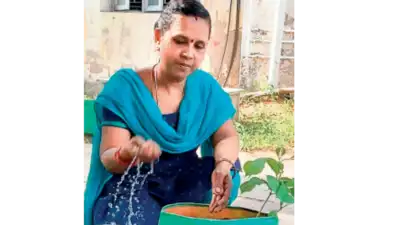ARTICLE AD BOX

The ‘Madras Mali’ programme aims to green the city while providing an opportunity for women from low-income households to engage in livelihoods.
Prabha V didn’t know how to pot a plant a few years ago. Today, the 45-year-old, trained in gardening under the ‘Madras Mali’ programme, is much in demand, working on gardens in homes across Adyar, Besant Nagar and T Nagar.
And it’s not just watering the plants but everything from preparing the soil, removing weeds, adding biopesticides and biofertilizers to composting. “I’ve worked for six days already this month, and it’s been hectic as it’s planting season. For six hours, I earn 850 per day,” she says, adding that in one of the houses, she was paid 1,000 a day for five days of work. The ‘Madras Mali’ programme, initiated by the Chennai Resilience Centre (CRC) and Okapi Research and Advisory, aims to green the city while providing an opportunity for women from low-income households to engage in livelihoods. “Nearly 250 women from self-help groups registered with Tamil Nadu urban livelihood mission (TNULM) have been trained in tending both vegetable and flower gardens.
Through the gardeners, we hope to encourage more residents to set up their own vegetable gardens and, by extension, engage in allied sustainable practices such as composting,” says Akshaya Ayyangar, senior research associate, CRC. “I got to know about the programme through the self-help group I was part of, and they taught us everything about gardening – how to make the flowers bloom better, what organic pesticides to use and more,” says Prabha.
It was only about providing an additional income initially, but about 30 of the 245 women have shown an interest in taking ‘Madras Mali ’ further into a career, and a core group of 10 go to work daily,” says Akshaya. “During Covid, we did a survey of residents in Chennai, and understood that a lot of people have gardens, especially vegetable gardens on terraces, but not necessarily the time or skills to maintain them. That’s when we decided to train low-income women in gardening.
” CRC is a philanthropic organisation that works mostly with the govt. “We hand out registered garden kits, each of which contains five grow bags, soil, and seeds, for both vegetables and greens,” says Krishna Mohan, chief resilience officer, CRC. “We’ve been encouraging schools and anganwadis or integrated child development centres, to use these kits which have mostly tomatoes, broad beans, spinach, lady’s finger, and greens.
The greens are very popular because they grow very quickly and can be harvested in 15 to 21 days.” In the future, they envision the ‘Madras Mali’ programme becoming a social enterprise run by the malis themselves and housed within TNULM, says Akshaya. “I never thought I would come out of the house and work,” says Adhilakshmi, a ‘Madras Mali’. Prabha says she doesn’t need to depend solely on her husband’s income now. “Above all, I developed the confidence to travel to the city by bus and visit all these places,” she says.
To book a Madras Mali, WhatsApp 9176588007.



.png)
.png)
.png)
















 2 hours ago
4
2 hours ago
4








 English (US) ·
English (US) ·